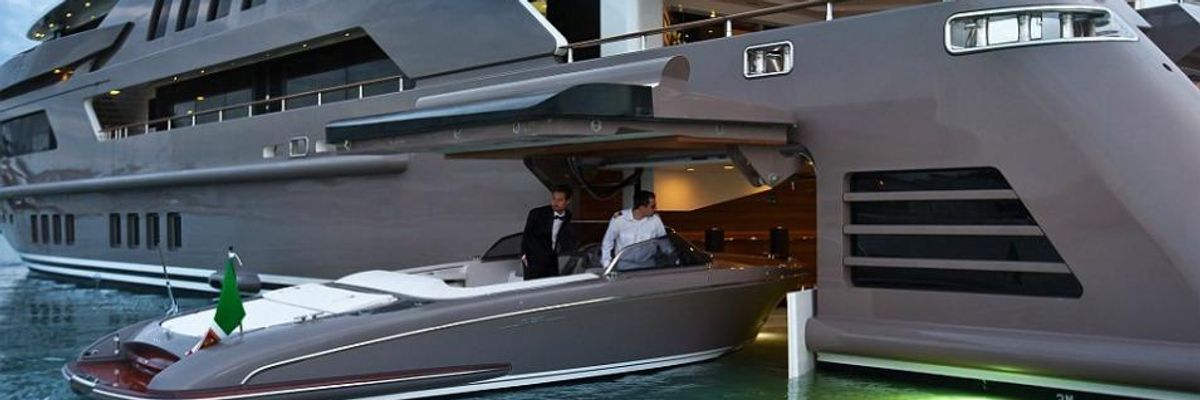The richest Americans hold more of the nation's wealth than they have in almost a century. What do they spend it on? As you might expect, personal jets, giant yachts, works of art, and luxury penthouses.
And also on politics. In fact, their political spending has been growing faster than their spending on anything else. It's been growing even faster than their wealth.
According to new research by Emmanuel Saez of the University of California at Berkeley and Gabriel Zucman of the London School of Economics, the richest one-hundredth of one percent of Americans now hold over 11 percent of the nation's total wealth. That's a higher share than the top .01 percent held in 1929, before the Great Crash.
We're talking about 16,000 people, each worth at least $110 million.
One way to get your mind around this is to compare their wealth to that of the average family. In 1978, the typical wealth holder in the top .01 percent was 220 times richer than the average American. By 2012, he or she was 1,120 times richer.
It's hard to spend this kind of money.
The uber rich are lining up for the new Aerion AS2 private jet, priced at $100 million, that seats eleven and includes a deluxe dining room and shower facilities, and will be able to cross the Atlantic in just four hours.
And for duplexes high in the air. The one atop Manhattan's newest "needle" tower, the 90-story One57, just went for $90 million.
Why should we care?
Because this explosion of wealth at the top has been accompanied by an erosion of the wealth of the middle class and the poor. In the mid-1980s, the bottom 90 percent of Americans together held 36 percent of the nation's wealth. Now, they hold less than 23 percent.
Despite larger pensions and homes, the debts of the bottom 90 percent - mortgage, consumer credit, and student loan - have grown even faster.
Some might think the bottom 90 percent should pull in their belts and stop living beyond their means. After all, capitalism is a tough sport. If those at the top are winning big while the bottom 90 percent is losing, too bad. That's the way the game is played.
But the top .01 percent have also been investing their money in politics. And these investments have been changing the game.
In the 2012 election cycle (the last for which we have good data) donations from the top .01 accounted for over 40 percent of all campaign contributions, according to a study by Professors Adam Bonica, Nolan McCarty, Keith Poole, and Howard Rosenthal.
This is a huge increase from 1980, when the top .01 accounted for ten percent of total campaign contributions.
In 2012, as you may recall, two largest donors were Sheldon and Miriam Adelson, who gave $56.8 million and $46.6 million, respectively.
But the Adelsons were only the tip of an iceberg of contributions from the uber wealthy. Of the other members of the Forbes list of 400 richest Americans, fully 388 made political contributions. They accounted for forty of the 155 contributions of $1 million or more.
Of the 4,493 board members and CEOs of Fortune 500 corporations, more than four out of five contributed (many of the non-contributors were foreign nationals who were prohibited from giving).
All this money has flowed to Democrats as well as Republicans.
In fact, Democrats have increasingly relied on it. In the 2012 election cycle, the top .01 percent's donations to Democrats were more than four times larger than all labor union donations to Democrats put together.
The richest .01 percent haven't been donating out of the goodness of their hearts. They've donated out of goodness to their wallets.
Their political investments have paid off in the form of lower taxes on themselves and their businesses, subsidies for their corporations, government bailouts, federal prosecutions that end in settlements where companies don't affirm or deny the facts and where executives don't go to jail, watered-down regulations, and non-enforcement of antitrust laws.
Since the top .01 began investing big time in politics, corporate profits and the stock market have risen to record levels. That's enlarged the wealth of the richest .01 percent by an average of 7.8 percent a year since the mid-1980s.
But the bottom 90 percent don't own many shares of stock. They rely on wages, which have been trending downward. And for some reason, politicians don't seem particularly intent on reversing this trend.
If you want to know what's happened to the American economy, follow the money. That will lead you to the richest .01 percent.
And if you want to know what's happened to our democracy, follow the richest .01 percent. They'll lead you to the politicians who have been selling our democracy.
